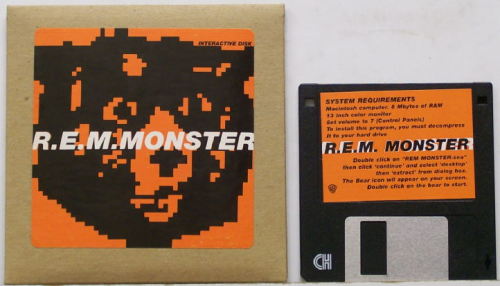Dear Students,
This just in from sharp-eyed Smiley Bone.
In 1947, ten cartoonists drew their characters blind-folded. Can you dig it? Wanna try it?
Filed under: comics
Some of these are truly remarkable in their fidelity.

"What really matters is what you like, not what you are like… Books, records, films — these things matter."
Dear Students,
This just in from sharp-eyed Smiley Bone.
In 1947, ten cartoonists drew their characters blind-folded. Can you dig it? Wanna try it?
Filed under: comics
Some of these are truly remarkable in their fidelity.

Monster Turns 20
(pictured: promotional 3.5” floppy disk)
I want this.
(via stereogum)
AMAZING.
This is wonderful.
New Disney Pogo? Yes please. Loving “The Trouble”.
According to Rolling Stone, 1984 was the greatest year in pop music history. And they made a list of the top 100 singles from that year; here’s the top 5:
5. Thriller, Michael Jackson
4. Let’s Go Crazy, Prince
3. I Feel for You, Chaka Khan
2. Borderline, Madonna
1. When Doves Cry, Prince1984 was also a fine year for movies and the most 1980s year of the 1980s. Both Bill Simmons and Aaron Cohen agree, 1984 was the best year.
Long live 1984.
—
Exclusive: U2 and Apple Have Another Surprise for You
If we think the present is wrong, we want the past to have been right, and to have existed in an eternal, unchanging state of rightness. But just as U2’s falling sales are the result (at least in part) of having been released in the MP3 era, Cole Porter’s success was equally as much the result of his unique historical circumstances. His success on Broadway was only possible because of the mass urbanization that had taken place in America over the last 50 years. The success of his songs independent of the stage relied on two inventions only recently popularized: radio and recorded music. Had Porter been working 20 years earlier, he would have had to rely on sheet music and home pianos for his music to spread, and would have consequently composed in a different way—and, presumably, a less successful one. We are all the product of historical circumstance, and while it is important to recognize the ways in which the present moment is different from those that came before, we have only two options for how to deal with these changes: adapt our own behavior to the new environment, or work to push through changes that will bring about some other new, more beneficial context. But there is no going back; culture is, as statisticians say, path-dependent, always determined by what came before. To pretend otherwise is de-plorable. (via barthel)
Everything about this.

Before conducting this experiment, I believed that there were essentially two broad types of music: the music you listen to, and the music you tell people you listen to. The second category comprises the songs shared on Facebook or Twitter, the shout-out to Neutral Milk Hotel in your OKCupid profile, the stuff you send your friends. As with most things, the image you try to present to the world is substantially more cultured and interesting than the mundane reality.
This article fascinated me, mostly because I feel like a) the music I tell people I listen to is actually the music I listen to and b) data analysis of my music listening habits is not new, and not especially limited to streaming services.
Yes, I’m weird and I look far more closely at this stuff than your average music fan, but why are play counts that new? iTunes has had them for more than 10 years now. We all know with one or two clicks what our most-played songs are, and it doesn’t take much to extrapolate our most-played albums and artists. Hell, Last.fm has been doing this for even longer.
The only revolutionary part about all this data is how it coincides with recommendation engines:
Normally when you create a radio station in Spotify, you feed in one song or one artist. Nestify feeds in an entire weighted cluster to generate three playlists: a “My Music” playlist, which is tightly focused on songs I’ve already played a lot; a “Discovery” playlist, made up of artists and songs that are outside the cluster but similar to ones inside the cluster; and a “Default” playlist, which comes somewhere in between the two extremes.
This is where streaming services will finally make their presence worthwhile. For now, the glorified “jukebox in the sky” remains nothing more than a be-careful-what-you-wished-for utopian vision.